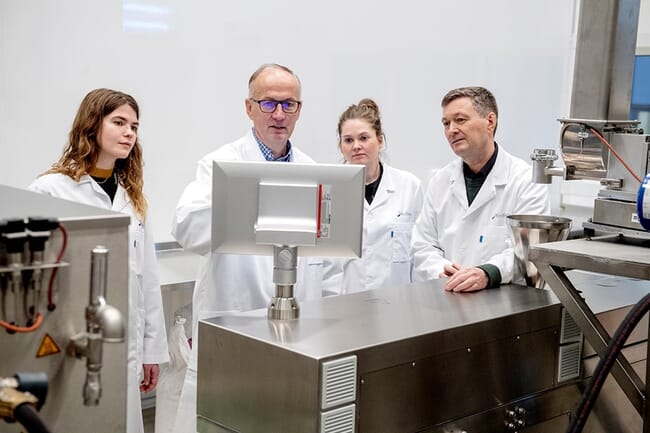
© Helge Skodvin/Nofima
Replacing fish oil with a more sustainable, oil-rich ingredient is a complex process. Defining what constitutes a sustainable ingredient is a separate issue, but it is reasonable to assume that microalgae are among them, as they are at the bottom of the food chain.
Feed development consists of two main aspects, technical and nutritional, as Nofima senior researcher Tor Andreas Samuelsen explains: "If you can't get the ingredient into the feed, you can't get it into the fish."
As part of the Millennial Salmon project, Nofima sought to determine how much of an algae-based product could be included in a salmon pellet and how it affected the fish that consumed the feed. The algae-based product Nofima tested is rich in the marine omega-3 fatty acid DHA and was supplied by Corbion. Unlike previous trials, the algae powder was mixed with rapeseed oil, resulting in a liquid product.
"What was exciting in this research was that to be able to design the feeds for the fish trial, we first had to conduct a technical evaluation of the ingredient to determine what levels we could achieve in the fish trial. For this algae product, we simply needed to get to know it technically first," said Samuelsen, in a press release.
Researchers at Nofima's Aquafeed Technology Centre measured technical pellet quality properties, such as hardness, water stability, oil leakage, and pellet pore size. Based on this work, they produced the trial feeds, which were sent to Nofima's research station in Sunndalsøra. There, the salmon were fed the various feeds and monitored and evaluated as they grew.
The feeding trial showed that the salmon responded positively to all the experimental feeds and digested the nutrients well. Additionally, the researchers found that a higher level of the algae product could be incorporated into the feeds than previously thought.
The research, which is now available, was funded by the Research Council of Norway and the industrial project partners Mowi, Labyerie fine foods, Cargill, Corbion, Innovafeed and Auchan.




